#Inter-Caste Marriages in India
Explore tagged Tumblr posts
Text
Inter-Caste Marriages in India: Legal Rights and Procedures
Introduction

Inter-caste marriages can be understood as those marriages that are similar to marriages where individuals from the different caste, religions or backgrounds get married. However, in order to provide such people from societal or familial pressure, a legal framework to govern the same becomes necessary.
Legal Rights and Procedures in relation to Inter-caste marriages in India
With respect to the procedures for inter-caste marriages,
Firstly, the couple who intends to marry, must file a joint application for registering their marriage at the Office of Marriage Registrar where either of the party resides. Herein, they shall specify their intention to get married and register the same under the Special Marriage Act, that allows for inter-caste and inter-religious marriages.
Secondly, once the application has been filed, a notice of such intended marriage must be displayed publicly at the office of the Marriage Registrar for a specified reasonable period, wherein objections may be allowed to be raised by any of the interested party, family members or relatives.
Thirdly, if any objections are raised during the notice period, the Marriage Registrar conduct an inquiry so as to verify the validity of the objections. Such objections may relate to any of the matter, that pertains to consent of the parties, or already an existing marriage being present, and so on.
Fourthly, after the notice period expires, and no objections are sustained, the marriage ceremony can further take place in any location as agreed by the Parties. The marriage would happen in the presence of witnesses and the Marriage Registrar.
Fifthly, once the marriage ceremony is performed, a marriage certificate would be issued to the married couple by the Marriage Registrar, which would serve as a legal proof of the marriage and the same may be required for various other purposes. Such certificate would provide legal protection for couples whose marriage is registered under the Special Marriage Act, 1954, that allows people to get married, without facing the barrier of caste, religion, background, or any other factors such as coercion.
The Special Marriage Act, 1954, is enacted specifically for the purpose of validating and registering the inter-caste and inter-religious marriages in India. According to this Legislation, both the parties must be capable of giving their consent and the marriage must be a valid marriage. Further, as told previously, a notice must be given to the Marriage Officer of the area, and such notice must be published to invite objections for the same.
“PRIME LEGAL is a full-service law firm in Bangalore that has won a National Award and has more than 20 years of experience in an array of sectors and practice areas. We provide exceptional legal services in family law, divorce law, criminal law, consumer law, civil law, and more. Don’t face your legal challenges alone! Reach out to Prime Legal for a consultation with the best family lawyers in Bangalore. Our dedicated team is here to support you and guide you toward a favorable outcome.”
WRITTEN BY: THANUJA ANTHIYUR ARAVINDAN
#best law firm in bangalore#best lawyers in bangalore#Law firm in Bangalore#Top law firm in Bangalore#Advocates in Bangalore#Inter-Caste Marriages in India#Inter-Caste Marriage
0 notes
Text
Within India, the most love marriages take place in Kerala and the north-eastern states. This could be due to a higher proportion of Christians and tribals without caste limitations. Yet the largest survey in India suggests that only 3% of marriages are love marriages, 93% are arranged, and 4% are "semi-arranged". Semi-arranged marriages are not based on love, although the youngsters have more say in them. Less than 5% of marriages are across castes. Youngsters marrying across castes have often been burned alive by their parents with the full approval of village elders to "save the honour" of the family and village. Honour killings represent the tyranny of the old over the young.
Swaminathan Aiyar, ‘Lesson from Bali: India needs more love marriages’, Times of India
#Times of India#Swaminathan Aiyar#India#Kerala#Christians#tribals#love marriage#inter caste marriage#Honour killing
29 notes
·
View notes
Text
Shame on Britishers and Muslims for teaching us patriarchy and discrimination
#did you know that in ancient india whenever that was everyone was sexually liberated and there was an open society where when you came out#your parents gave you a party and the king would visit you and donate to you a piece of land#and nobody was ever oppressed and the adivasis were never stripped of their land they willingly gave it up for the Hindu brothers and siste#and there was no such thing as caste system and inter caste marriage was totally supported... NO NO NO don't look at the manusmriti... and#women were never married off at the age of 14 I TOLD YOU DO NOT LOOK AT THE MANUSMRITI#sorry this all sounded hilarious in my head tumblr is dead and not going to lie the pride in forseeing all of this fades away when you#so yeah
14 notes
·
View notes
Text

Inter Caste Marriage Astrology Solution In India
Rajguru Jyotish is an effective inter-caste marriage astrology solution provider in India. He helps the couples overcome the problems that rise because of the difference in caste. His astrological remedies are simple and very effective to solve the family tiffs and have a peaceful life after marriage. Several couples have successfully overcome caste-based issues with his efficiency.
#Inter Caste Marriage Astrology Solution In India#famous#astrologer in ahmedabad#astrologer#ahmedabad#lost love back#expert
0 notes
Text
Model and Actor Richa Mehta Marries Debashish Kalita: A Private Ceremony Celebrating Love Beyond Societal Norms #RichaMehta #DebashishKalita
Model and Actor Richa Mehta Ties the Knot with Debashish Kalita in a Private Ceremony: A Celebration of Love Beyond Boundaries The renowned model and actor Richa Mehta, celebrated for her remarkable social media presence and notable performances, has entered a new chapter in her life by tying the knot with Debashish Kalita. In a world where lavish weddings dominate headlines and social media…
#Age difference relationships#Celebrity news India#Debashish Kalita#Inter-caste marriages#Intimate weddings 2024#Modern wedding trends#Private celebrity weddings#Richa Mehta wedding#Roseate New Delhi wedding#Wedding mental health
1 note
·
View note
Text
Lately, I learnt , marriage is more about investing on your partner’s ability to understand your communications and unspoken words, making efforts irrespective of determining who is at fault , not giving up in relationship spirit, unconditional love (no complaints/ no conditions, conditional acceptance are scary), making her and her family equally important with one’s family, talking more about growth and life ventures and most importantly, the art of forgiving after learning you made a mistake.
Yes, one who forgives you and accepts you despite you hurting them, don't leave them. But make sure, you don't repeat the mistake again.
Life is too short, why spend it with unhappiness? Stay with one who is fucking crazy to be with you. 🫶
#relationship#inter caste marriage#marriage#indian#india love#words#spilled thoughts#emotions#deep thoughts#mentality#words words words#my words#mental stability#deep love#love#india#married life
1 note
·
View note
Text
Inter Caste Marriage Problem Solution | Shiv Rudra Astrologer
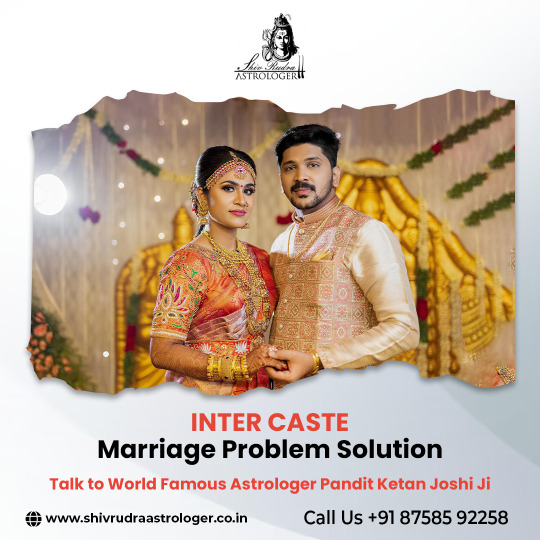
If you're facing challenges in an inter-caste marriage, seek the guidance of Shiv Rudra Astrologer for a solution. With their expertise in astrology, they have helped numerous couples overcome obstacles and find harmony in inter-caste marriages. Shiv Rudra Astrologer offers personalized advice and remedies tailored to your specific situation, addressing concerns like societal pressure, family objections, and cultural differences. With their compassionate approach and effective solutions, they pave the way for a successful inter-caste marriage. Don't let the barriers discourage your love—contact Shiv Rudra Astrologer today for the perfect solution to your inter-caste marriage problems.
Shiv Rudra Astrologer is the best Inter Caste Marriage Problem Solution. For more information visit on : https://www.shivrudraastrologer.co.in/inter-caste-love-marriage-solution or call us on : +91-8758592258
#Inter caste marriage problem astrologer in gujarat#inter caste marriage problem solution astrologer in gujarat#inter caste marriage astrologer in gujarat#inter caste marriage specialist in gujarat#inter caste marriage astrologer in ahmedabad#inter caste marriage expert in ahmedabad#inter caste marriage specialist astrologer in ahmedabad#inter caste marriage problem solution astrologer in ahmedabad#inter caste marriage problem solution#inter caste love marriage problem solution astrologer in ahmedabad#inter caste marriage expert astrologer in india#inter caste marriage astrologer in india#inter caste marriage expert baba ji#inter caste marriage specialist baba ji in ahmedabad#inter caste marriage astrologer near me#inter caste marriage baba ji near me
0 notes
Note

Saw your tag and went to the blog and 😂😂😂😂 ye log kitne khush k ki genocide ho raha hain.
in india...they lynch dalits for eating beef...they kill people for getting into inter-caste marriages...straight people themselves don't have rights...they'll kill you for being gay in india . . . wait why aren't you racist to indians
60 notes
·
View notes
Text
Unmasking Honor Killings: A Socio-Legal Perspective
A few days ago, I sat in my dimly lit room , my heart racing as the story unfolded on the screen. Janhvi Kapoor and Ishaan Khatter portrayed star-crossed lovers, Parthavi and Madhukar, who dared to defy societal norms. Their love transcended caste boundaries, but it came at a steep price—the wrath of Parthavi’s family. As the scenes unfolded, I couldn’t tear my eyes away. The haunting music, the stolen glances, and the palpable tension—all of it echoed the pain of countless real-life couples.

How can love be a crime?
Why do families prioritize honor over their children’s happiness?
When will society break free from these shackles?
And then it hit me—I had to write about this. Not just as an academic exercise, but as a plea for change. The movie “Dhadak” became my catalyst, igniting a fire within me to expose the darkness of honor killings.
Introduction
Honor killings, a dark reality in many societies, continue to haunt us. These acts of violence are perpetrated against individuals—often women—who defy societal norms by marrying against their families’ wishes, having pre-marital relationships, or seeking divorce. In India, honor killings are particularly prevalent, impacting families, communities, and the fabric of our society.
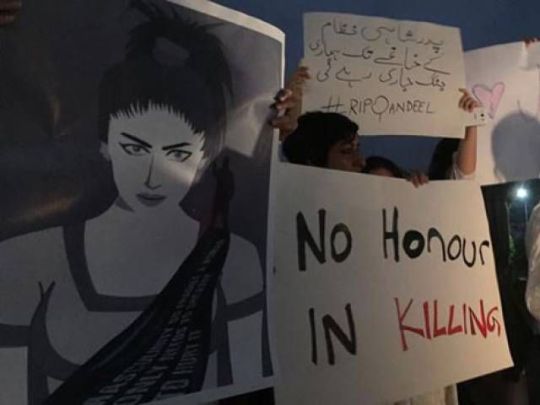
Understanding Honor Killings
Definition: Honor killings involve the murder of a family member, usually a woman, due to perceived dishonor or shame brought upon the family.
Triggers: Reasons for honor killings include inter-caste or inter-religious marriages, pre-marital relationships, and even allegations of adultery.
Gender Bias: While both men and women can be victims, women bear the brunt of this violence. The mere perception of dishonoring the family can lead to a brutal attack on their lives.
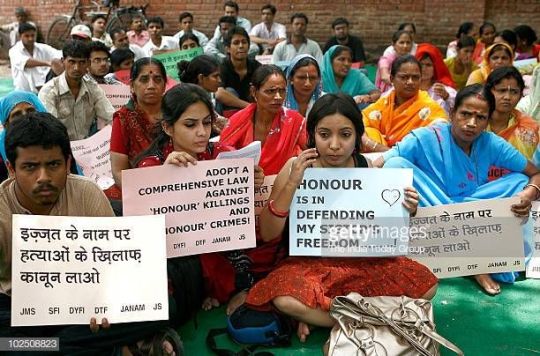
Socio-Legal Context
Morality: Indian society adheres to a caste-based stratification system, where caste and gender identity at birth determine one’s status. Transgressing these boundaries disrupts the social order.
Article 21: The Constitution of India guarantees the right to life and personal liberty. Honor killings directly violate this fundamental right.
Legal Framework: Although there’s no specific law addressing honor killings, existing provisions under the Indian Penal Code (IPC) can be invoked to prosecute offenders.
Case Studies
Rajkumar and Deepa: A Dalit-Thakur couple faced brutal violence after fleeing their hometown to marry. Deepa’s family couldn’t accept their love, leading to Rajkumar’s tragic death.
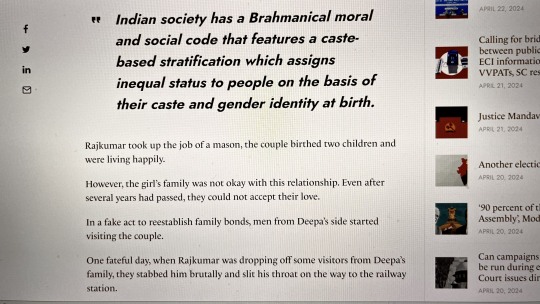
Kaushalya and Shankar: Despite opposition, this inter-caste couple married. However, they were attacked in broad daylight by Kaushalya’s family.
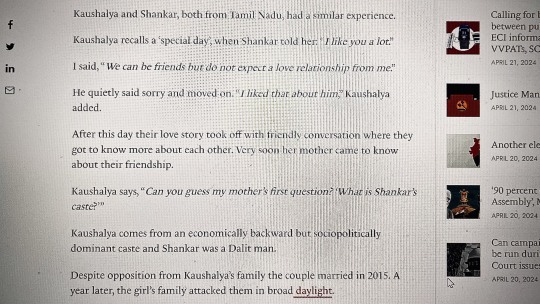
In the last 15 years, over 30000 men, women, and children have been killed in the name of "Honour"
Killing innocent love is not Honourable. It is an act of cowardice and a crime against humanity.
CONCLUSION
In the face of honor killings, our society must confront this issue head-on. It’s time to raise our voices, challenge entrenched norms, and pave the way for a more compassionate and just world—one where love is not a currency that costs lives.

8 notes
·
View notes
Text
The Dark Side of Honor Killings: Cases that Shocked India
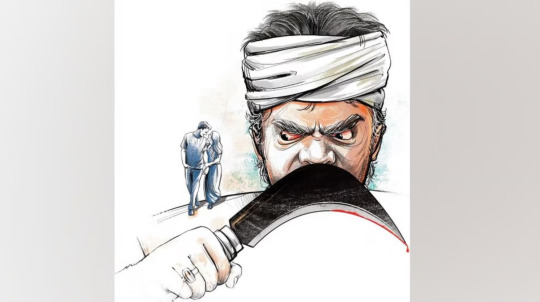
Honor killings remain one of the most disturbing forms of violence in India, highlighting the clash between age-old traditions and modern legal and moral standards. Rooted in rigid concepts of family honor, caste, and patriarchy, these heinous acts often target young couples who defy social norms, such as inter-caste or inter-religious relationships. What makes honor killings even more tragic is the involvement of the victims' own families, driven by the belief that they are restoring honor through violence.In most cases, the victim is a woman, although in several cases the man/boy is also targeted. The victims in some cases are also those belonging to the queer (LGBTQ+) community.
Several cases of honour killings from India’s urban and rural pockets go unreported. The National Crimes Record Bureau’s report for 2020 revealed that 25 cases of “honour killing” were reported in the preceding year. In the previous years, the reports stated that only one incident each took place in 2018 and 2017. But Evidence, an NGO, revealed in November 2019 that as many as 195 known cases of honour killings were reported from Tamil Nadu alone in the past five years.
India has witnessed several brutal cases that shook the nation’s conscience, raising awareness of the deep-seated cultural norms that perpetuate this violence. [1]
5 Recent Brutal Murders: A Closer Look
1. The Keelvenmani Murders (2021)
In another heart-wrenching case from Tamil Nadu, a Dalit boy, Nirmal Kumar, and his lover, Subhashree, from the dominant Vanniyar caste, were brutally murdered by Subhashree’s family for eloping. The couple, aged just 21 and 20, had sought refuge from Subhashree's relatives who opposed their relationship due to the caste divide. Despite fleeing for safety, they were tracked down and killed in cold blood.This modern-day horror reignited debates about casteism in India, as Subhashree's family faced no remorse for taking the lives of their own kin and her partner. The media coverage and outrage that followed demonstrated how honor killings transcend mere family dynamics and are deeply rooted in India's hierarchical social structure. [6]
2. Afsana Case (2020)
Afsana’s case was yet another painful example of how interfaith relationships can become lethal in India. Afsana, a young Muslim woman from Uttar Pradesh, fell in love with a Hindu man, which led to escalating tensions within her conservative family. Afsana’s family disapproved of the relationship, fearing that it would bring shame to their community.In a brutal turn of events, Afsana was strangled to death by her own father and brothers to preserve the family's so-called honor.Afsana’s murder was one among several interfaith love stories in India that faced a similar fate, amplifying the communal tensions surrounding interreligious marriages. Her death not only reflected the patriarchal control over women’s bodies and choices but also pointed to the growing religious intolerance in the country.[5]
3. Ilavarasan-Divya Case (2013)
The tragic love story of Ilavarasan and Divya from Tamil Nadu exposed how caste continues to dictate relationships and, in extreme cases, lead to honor-based violence. Ilavarasan, a Dalit man, married Divya, a woman from a higher Vanniyar caste, defying the rigid caste system in rural Tamil Nadu. Divya's family and her community could not tolerate their marriage, and her father was accused of driving her to leave Ilavarasan after intense pressure.Soon after, Ilavarasan was found dead near railway tracks, in what many believe to be a planned murder disguised as a suicide. The case caused widespread protests across Tamil Nadu, exposing the caste-based discrimination that still plagues rural India. Ilavarasan’s death was a grim reminder of how deep-rooted prejudices continue to determine the fate of young couples in love, often ending in tragedy. [4]
4. Manoj-Babli Case (2007)
The infamous Manoj-Babli case from Haryana became a turning point in India's fight against honor killings. Manoj and Babli, who belonged to the same "gotra" (clan), defied societal norms by eloping and marrying. Their marriage enraged Babli’s family and village elders, who deemed their union incestuous, even though it was legal by Indian law. The Khap Panchayat, a local caste council, ordered their murder, and the couple was abducted, tortured, and killed by Babli's relatives.This case was significant as it led to the conviction of several members of the Panchayat, as well as Babli’s family, making it the first time an Indian court had handed down such a severe punishment for an honor killing. The case exposed the authority of Khaps in rural India, which often override state laws, and underscored the urgent need for legal reform to protect young couples. [3]
5. Nitish Katara Murder Case (2002)
Another chilling case is that of Nitish Katara, a young businessman who was brutally murdered by Vikas Yadav, the son of a prominent politician, because he was in love with Vikas’ sister, Bharti Yadav. The Yadav family, a powerful political dynasty, opposed the relationship as they felt Nitish did not belong to their caste or social class. Nitish was abducted, beaten, and burnt to death in a gruesome crime that shocked the country.The long legal battle for justice was a testimony to how honor killings are often connected to the powerful political class, where perpetrators use their influence to evade justice. The Katara family fought relentlessly, and in 2016, Vikas Yadav was sentenced to life imprisonment, marking a major victory against entrenched social inequalities and caste hierarchies. [2]
Laws to Deal with ‘HONOUR KILLING’
In India, honor killings are not governed by a specific law but are prosecuted under general criminal laws, particularly those dealing with murder, homicide, and violence. However, there have been legal measures, court rulings, and proposed bills to address the unique nature of such crimes. Below is an overview of the legal framework and key court interventions in dealing with honor killings:
1. Indian Penal Code (IPC)
Honor killings are generally prosecuted under the following sections of the IPC, which deal with murder and other violent crimes:
Section 302 (Murder): Punishes the crime of murder with life imprisonment or the death penalty.
Section 307 (Attempt to Murder): Applies to cases where the victim survives the attack.
Section 120B (Criminal Conspiracy): Used when multiple people are involved in planning and executing the killing, such as family members or community leaders.
Section 34 (Acts Done by Several Persons in Furtherance of Common Intention): Often used when several people collectively carry out the crime.
Section 364 (Kidnapping or Abduction in Order to Murder): Applied when the victim is kidnapped before being murdered.
Section 376 (Rape): In some cases, sexual assault is also part of the violence related to honor crimes.
2. The Protection of Women from Domestic Violence Act, 2005
While not specifically designed for honor killings, this act provides civil remedies for women facing violence or abuse, including threats of harm related to "family honor." In cases where women are threatened with honor-based violence by their families, they can seek protection under this law.
3. The Indian Constitution
Article 21 (Right to Life): The Supreme Court of India has held that honor killings violate the fundamental right to life and personal liberty enshrined in Article 21 of the Constitution.
Article 14 (Right to Equality): Honor killings, often motivated by caste or gender-based discrimination, are seen as violations of this article, which guarantees equality before the law.
Article 15 (Prohibition of Discrimination on Grounds of Religion, Race, Caste, etc.): In cases where caste or religious differences motivate honor killings, Article 15 is cited.
4. Key Court Judgments
The Supreme Court of India has played a crucial role in addressing honor killings through its judgments, recognizing them as a serious violation of fundamental rights.
Shakti Vahini vs. Union of India (2018): In this landmark judgment, the Supreme Court strongly condemned honor killings and directed state governments to take preventive, remedial, and punitive measures. The court issued guidelines aimed at curbing the influence of Khap Panchayats (traditional caste councils) that often sanction such killings.
Arumugam Servai vs. State of Tamil Nadu (2011): The Supreme Court declared that any person or organization supporting or encouraging honor killings would be subjected to harsh penalties, including the death penalty in certain cases.
5. Proposed Legislation: Prevention of Crimes in the Name of 'Honor' and Tradition Bill, 2010
This proposed bill, introduced in the Rajya Sabha in 2010, sought to address honor killings specifically. Although the bill has not yet become law, it aimed to:
Criminalize the intimidation or harassment of couples who marry against societal or familial norms.
Penalize acts of violence, harassment, or coercion by family members or caste councils (Khap Panchayats).
Impose stricter penalties, including imprisonment and fines, for those found guilty of such crimes.
Criminalize the act of forcing a person into marriage to restore "family honor."
The bill has not been passed, and honor killings continue to be prosecuted under existing criminal laws.
6. Law Commission of India (2012) Recommendations
The Law Commission of India, in its 242nd Report, recommended a specific legal framework to deal with honor crimes. The report called for:
The introduction of a new Section 300A in the IPC to criminalize honor-based crimes.
Recognizing crimes committed in the name of honor as a distinct offense, with special provisions for harsher punishment.
Creating a legal mechanism to tackle the involvement of village or caste panchayats in sanctioning honor killings.
7. Preventive Measures
Police Protection: Courts can direct the police to provide protection to couples who fear for their lives due to the threat of honor killings.
District Magistrate’s Role: The Supreme Court has directed district magistrates to take preventive measures, such as keeping a watch on areas where such crimes are prevalent, and ensuring that couples who marry out of choice are protected. [7]
8. Death Penalty for Honor Killings
While Indian law does not provide a specific provision for the death penalty in honor killing cases, courts have imposed the death sentence in some cases under the "rarest of the rare" doctrine. This doctrine allows for the death penalty in cases where the crime is deemed exceptionally brutal or heinous, as in many honor killing cases.
Honor Killings: The Larger Picture
The common thread in these cases is the deep-seated social structure in India that prioritizes family honor, caste purity, and community approval over individual freedoms and personal choices. Honor killings often occur in rural areas but are not limited to them. The influence of caste-based councils, or Khaps, is still strong in many parts of the country, where they wield unofficial but significant authority, often leading to such heinous crimes.
The Legal Struggle
Despite the growing awareness around honor killings, India does not have a specific law addressing this form of violence. Such killings are prosecuted under general murder laws, but activists argue that these laws fail to address the cultural and social factors that fuel such crimes. Several attempts have been made to pass a comprehensive law targeting honor-based violence, but progress has been slow.
Conclusion
Honor killings reflect the darkest aspects of India’s social fabric, where archaic traditions collide with modern values of personal freedom and choice. The cases of Manoj-Babli, Nitish Katara, Ilavarasan-Divya, and others serve as tragic reminders of the lives lost to this outdated concept of family and social honor. As India continues to evolve, the need for legal reforms, societal education, and support systems for young couples becomes ever more critical to prevent such atrocities in the future. Although India does not have a dedicated law for honor killings, the existing legal framework provides several avenues to prosecute and punish offenders. The judiciary has been proactive in addressing the issue through landmark judgments, while civil society continues to push for specific legislation that acknowledges the unique social and cultural dimensions of honor crimes. Until a comprehensive legal framework is enacted, honor killings will continue to be prosecuted under general criminal laws, and the battle against these brutal practices will rely heavily on enforcement, awareness, and education.
Sources:
1. https://journals.sagepub.com/
2. www.newindianexpress.com
3. https://blog.ipleaders.in/
4. https://blog.ipleaders.in/
5. https://www.thehindu.com/
6. https://www.rediff.com/
7. www.britannica.com
3 notes
·
View notes
Text
My school friends are getting married
“ONE MAHARASHTRIAN GOT MARRIED WITH A SOUTH INDIAN”
Another, Maharashtrian getting married to Muslim Woman
“INTER CASTE LOVE. They don't care what society thinks. All they care is they love someone, and they want to stay happy in life.
Society do not dictate their relationship.
So “be with the person who loves you”, who cares for you, Coz tomorrow if you die, society bother it least, and you will be just remembered saying Rest in peace.
Never regret that my life could have been beautiful if I could have lived it with the person who loves me.
#inter caste marriage#indian#india love#i love her#relationship#deep quotes#deep thoughts#poetry#original poem#india#words#original story#love quotes#lovers
0 notes
Text

#marriage problem solution#cousin marriage problems solutions#inter caste love marriage problem solution#intercaste love marriage problem solution#marriage problem solution astrologer#marriage problems solutions astrology#top marriage problems and solutions#love marriage problem solution#love marriage problem#love marriage problem solution baba ji#astrologer for love marriage problem solution#love marriage problem solution specialist molvi ji#after marriage love problem#after marriage love problem solution#late marriage health problems#late marriage problems#late marriage problems in india#late marriage problem solution#late marriage problems astrology
0 notes
Text
#Marriage_In_17Minutes
In a society where daughters are still burned alive for dowry, disciples of Sant Rampal Ji Maharaj understand that dowry is like poison. They are putting an end to this evil through inter-caste marriages guided by spiritual knowledge.
Dowry Free 🇮🇳India

6 notes
·
View notes
Note
hi sorry to bother you but could you please tell us more about the special marriage act?
Hiiii no problem! I haven't extensively studied the Special Marriage Act (SMA) as of now but I can give a brief overview
So basically the whole logic behind SMA was to allow inter-faith/inter-caste/non-conventional couples to marry legally. As you probably know in India we have personal laws for every religion and all these laws have different rules and rationales, they draw from tradition and culture of the religion. But if both the parties are of different religions or customs one of them have to convert. To remove this problem, SMA is used to marry without conversion or customs. The rules under SMA are similar to Hindu personal laws (like inheritance, child rights, divorce, etc etc) and SMA has been added to most other laws to give legal space to such couples
SMA is also probably the easiest way to include queer couples because otherwise every personal law will have to be amended extensively. And the religious zealots will not let that happen anyways. What we proposed today was changing the word man/woman and wife/husband to two consenting adults and spouses to make it gender neutral.
The major problem with SMA however is that for a legal marriage you will have to go to a registrar who will issue a 30 days public notification inviting any objections to the marriage. The law says that "unreasonable objections" won't be entertained but in reality it solely depends on the official. If he doesn't want to see a Hindu-Muslim marriage he can entertain the objection and discard the marriage. So the couple will have to start all over again. This also causes significant safety concerns because their location gets outed to their unwilling families.
The whole point of marriage equality should be that two consenting adults are intelligent enough to choose their own partner but unfortunately India places too much value in customs and family.
I'm not really sure what else will they propose under SMA but yeah that's basically the gist of it
23 notes
·
View notes
Text
People get murdered in my country (by their own family members) for falling in love and marrying outside of their own caste. Look it up, honour killing is very common in North India, inter religious marriages are just a different story altogether. Even in my own family I'd most definitely be frowned upon if I married someone outside of my caste..forget about marrying someone that's from a different religion or country.
Good thing i don't want to get married at all.
I see people getting offended over such trivial matters like shipping fictional people where they're signing petitions and threatening the creators when their needs are not met and it comes across as so tone deaf where I'm like hmmm is this what it is like when you're living in a first world country? Because people in other countries are fighting to even have basic human rights in life.
The only people who are brave enough to come out as a member of LGBTQ here are mostly the celebs/influencers or those who luckily have a strong support system around them because the rest of them get ridiculed, alienated and are made fun of constantly or killed. Homophobia exists everywhere (even in the USA or the UK or every other first world countries..I'm not at all denying or turning blind eye to that) but in some places it's still literally illegal to be homosexual.
So like, count your blessings and privileges because in some parts of the world humans don't even have the right to be themselves. File petitions and show your anger for things that would actually matter instead of cribbing about fictional couples all day long, media is meant for entertainment.
#when theres an actual gay couple in a show you all just gloss over it as if they dont exist#the obsession woth shipping seemingly platonic relationships is something i wont understand
5 notes
·
View notes